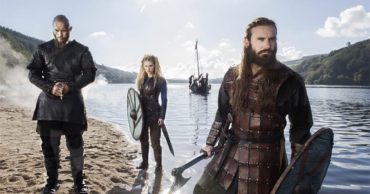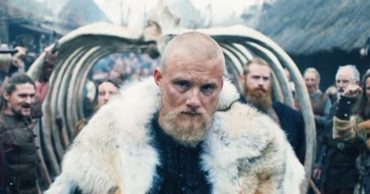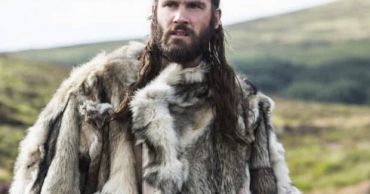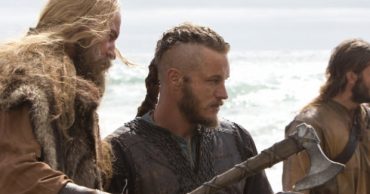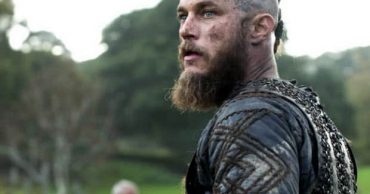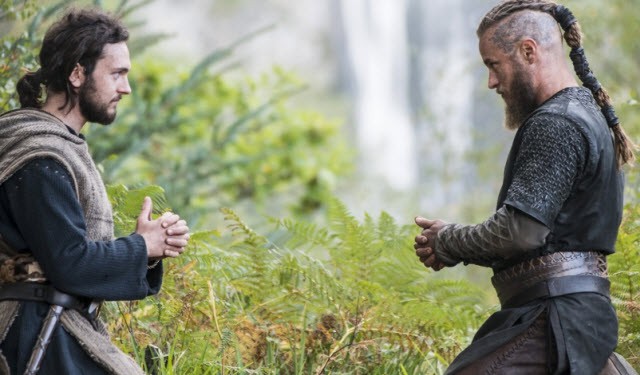
After such a surprisingly strong second season to this point, I’m equally surprised to see “The Lord’s Prayer,” the season finale of Vikings, be so disappointing. I’d like to qualify that by saying the episode itself is a fine episode of television. At the very least, the technical stuff here–beautiful, sweeping shots and great editing during the climactic fight sequence–bumps this up above the standard TV milieu. Yet, the areas in which Vikings excelled this season were ones beyond those that composed its exterior. The substance this year had constantly been teetering on greatness, and it looked as though the series was poised to make the full jump into Appointment Viewing. The main problem for me is how last week’s episode set this one up. It’s good to see that Michael Hirst has forward-thinking vision, much like his central character, Ragnar, but holding off on certain payoffs and confrontations takes away a lot of the momentum, and that choice ended up leaving “The Lord’s Prayer” with very little to do. One of the most entertaining aspects of this season has been seeing Athelstan pulled between two worlds and how that has affected his relationships with both Ecbert and Ragnar. But Ecbert is nowhere to be seen here, having sorted out his issues temporarily with Ragnar, and if Athelstan had a single line of dialog in this finale outside of the prayer scene, I wouldn’t be able to remember what it was to tell you.
Instead, the episode focused on the scheming of Floki and Horik. Both of these characters are interesting in their own ways, and this season has done a great job of making Floki much more three-dimensional. The fact that this duo hadn’t been used as narrative tent poles, though, made the stakes in “The Lord’s Prayer” much lower than they should have been. Horik was a goner no matter what. If it weren’t the facts that Donal Logue was in the role and that an actor in that high of demand probably wasn’t going to stick around for very long, it was that Horik no longer had a place in Vikings. If the king isn’t on-board with Ragnar, then he’s on a one-way trip to Valhalla. And this was the case with the finale. While that much was predictable, Logue’s send-off was a beauty to watch. There was the nice touch of having several different central characters get a slash of the axe or sword in, but then seeing Ragnar almost ritualistically give the killing blow was icing on the metaphorical cake. Logue is simply a wonderful actor, and he’s done solid work in Vikings, finding one of the stronger accents in a cast that really has to get into a groove as far as that part of the acting is concerned. Some are noticeably inconsistent; Logue has been an anchor there.
Admittedly, revolving the episode around Horik and Floki could have been executed much worse. Hirst does a great job here of making it seem like Floki is going to bite the dust, too. Shows like The Walking Dead and Game of Thrones have helped show viewers some of the writers’ techniques regarding highlighting certain characters in ways that foreshadow their exits. So much of “The Lord’s Prayer” focuses on Floki as a doomed figure that even though it becomes obvious later in the episode what Floki is doing, that realization that he has always been loyal to Ragnar is a jolt of satisfaction. It’s strange how little Ragnar has to do in the episode, but Gustaf Skarsgard carries the majority of the hour on his back with relative ease. And yet I can’t quite let it go that all of this material simply isn’t as interesting as what’s been going on in the previous nine episodes of the season. In some sense, though, that’s not unusual for Vikings, which is a series that is unusual to begin with. Last season, too, didn’t have a typical kind of ending, which makes me wonder if it’s even a good idea to think of seasons in ways that necessitate some kind of sense of an ending. The fact that I’m so used to that is the main reason why I didn’t think “The Lord’s Prayer” was up to par, but do seasons have to be function as units with beginnings, middles and ends? For that matter, do episodes need to do that? Or can some television series get away with breaking free of that structure and letting the material just vibrate as is? There’s still plenty to consider between now and when Vikings returns next year. What, for instance, does all of this mean for Ragnar’s attitudes as a ruler? Does betrayal creep in more often in the back of his mind, causing him to trust people less and less?
Those kinds of questions are interesting to think about if also somewhat underwhelming as the stuff that’s supposed to carry over the course of nine months or so. I also wonder how we’re supposed to look at Bjorn’s story at this stage. Much effort has been put into his character, especially his relationship with Porunn, which kind of came out of nowhere but has been stubbornly stuck to in the writing. Their fist fight in this episode works pretty well as a scene, but, again, the sense of an ending here is really just that they’re together…I think? I know some viewers and critics get annoyed with relationships like this are dragged out over more episodes than they need to be, but it seemed like there was more to explore in how Porunn tells Bjorn that there is the freedom of choice now that she is no longer a slave. I would have liked to have seen more of Bjorn earning the love of a Porunn who had more options open to her than to have that seemingly resolved in this episode (also, seeing more of her training so that she might pose a better challenge for Bjorn in a fight would have worked equally well). These are small quibbles, however–ones that just kind of highlight that there could have been more to “The Lord’s Prayer” and the ending of this season in general. It doesn’t necessarily color this collection of episodes badly. This has still been a step up for Vikings in the same way that shows like Banshee, Arrow and Elementary found a formula that worked even better in their second seasons. Here’s hoping that overall upward trajectory continues into next season, and that the build up of tensions get paid off better when that season ends.
[Photo via Jonathan Hession/History]
 Follow Us
Follow Us
